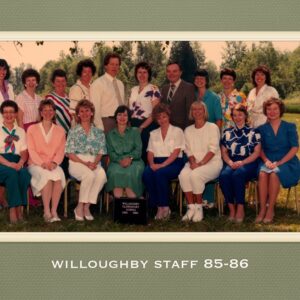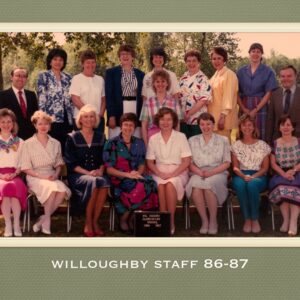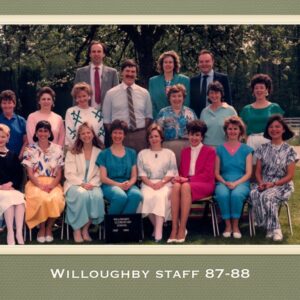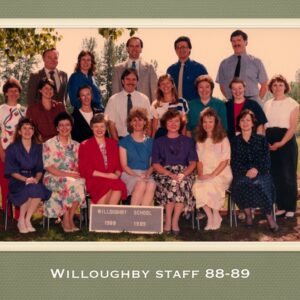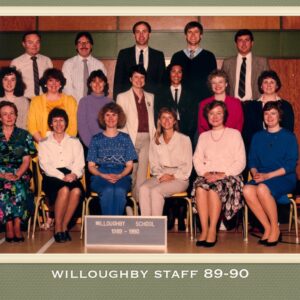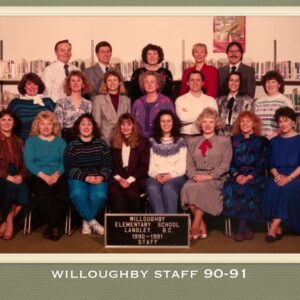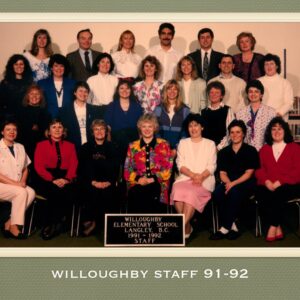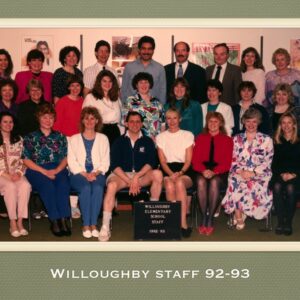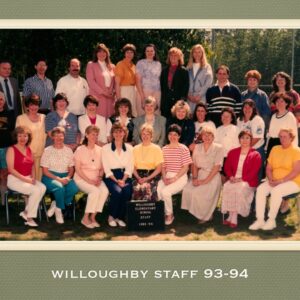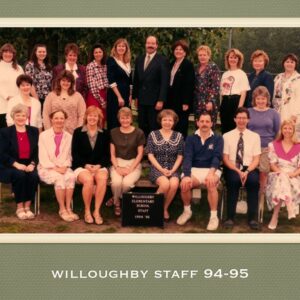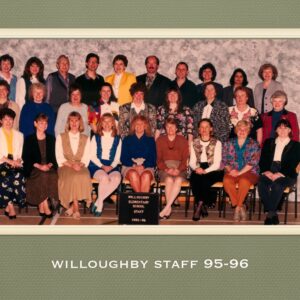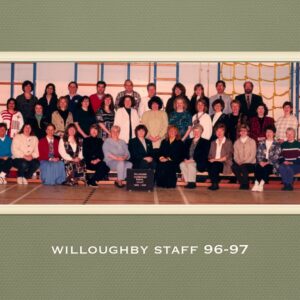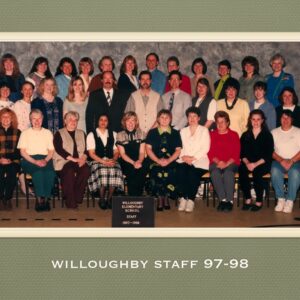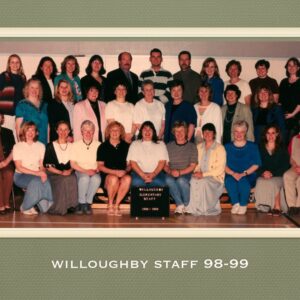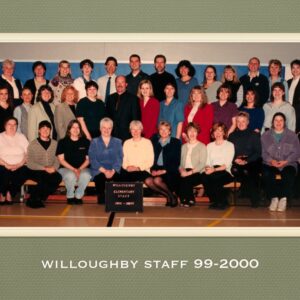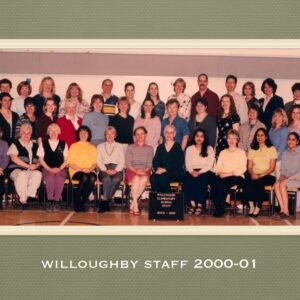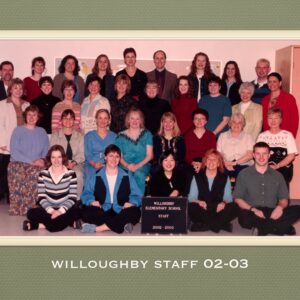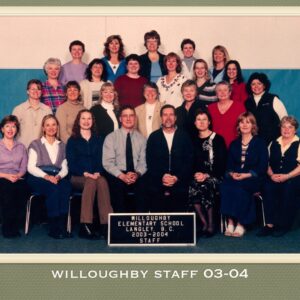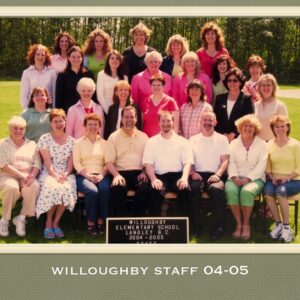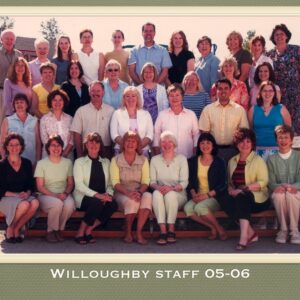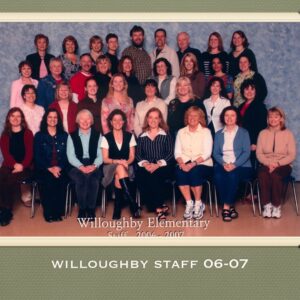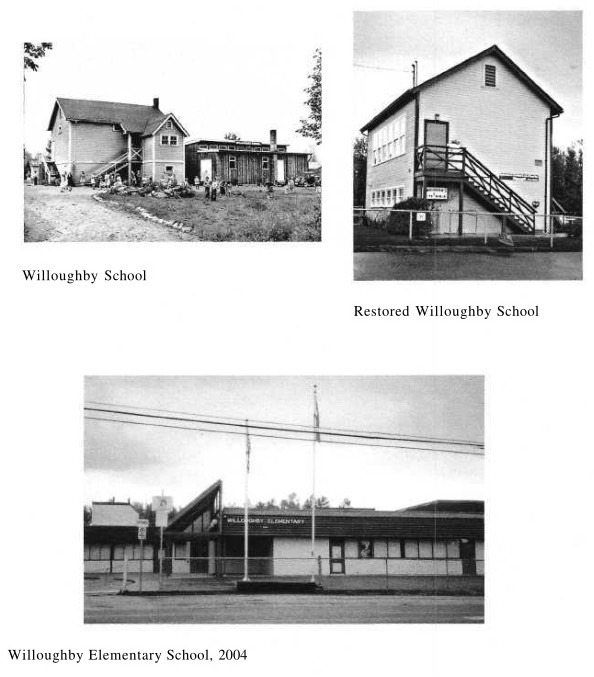Willoughby Elementary has one of the most checkered pasts of Langley district’s older schools.
The area was originally named “Willoughby” after a man named Willoughby Singer, who owned a little store and post office beside the Community Hall on 208 Street during the 1920s.
In the early 1920s, the settlers in the Willoughby area decided to build a hall at 8280- 208 to house classes for local students. In order to raise funds, they held Saturday night dances in various homes, with a portable gramophone and records being carried around to provide the music. These evenings were a success, and John Bray donated the land for the hall. Unfortunately, despite a good cooperative effort to build the hall/school, dissension arose on opening night over who should deliver the opening address. Regardless, Miss Lye was installed as the school’s first teacher. She was expected to instruct grades 1 through 8, and had between twenty and thirty pupils at any one time under her charge.
When County Line Elementary School burned down in 1931, an agreement was made with the contractors to build a two-storey school at Willoughby, as well as to rebuild County Line. The $5,000 insurance settlement from the fire covered the cost of construction of both buildings. The new building was located at 20766 – 80 Avenue.
The two-storey building consisted of an upper-storey classroom and a basement play area. Expansions were made on the school grounds and an annex was built during the 1960s, but a fire struck the school’s additions on November 27,1975. The fire fighters had the blaze under control five times during the night, but were unable to keep it from spreading each time due to water shortages. Wind blew the fire away from the old school, but most of the annex was destroyed. Two classrooms, the staff room, and the school’s gymnasium were the only additions remaining intact. Damage from the blaze was estimated at more than $600,000. The students had to be accommodated in the old school, the Willoughby Hall, and nearby church basements during reconstruction in 1976-7.
NEW WILLOUGHBY SCHOOL (1976-2004)
The new school has concrete block with wood frame construction. The exterior finish is concrete block and stucco. The windows are wood and aluminium. The waste is stored in a large holding tank and then pumped to a municipal sewer. In 1982, four more classrooms and washrooms were built. In 1994 there was further expansion, and in 2000, another four classrooms, two special needs rooms and a computer room were added. The school in 2002 had 19 standard classrooms, a gymnasium, library, basement, Kindergarten room, computer room, a learning assistance room, and a TMR room. There is a four-foot galvanized chain link fence around the school. The grounds have two swings, two gym climbers, three climbers, a teeter-totter, a rock dust jogging track, an asphalt play court, and asphalt parking. It is located on 6.16 acres (2.49 hectares). Seismic upgrading was done in the spring of 2004.
In 2004 the school has a pupil enrolment of 345. The principal is Kathleen Boles, who replaced Gary Sasaki in 2002 when he retired. The new vice principal is Ron Stare. The school secretary is Patricia Prentiss. Long-time principals over the years have included Leo Swoboda and Rob Ross. Over the past few years the school has experienced a decline in enrolment, but this will increase as families move into the new Willoughby subdivisions. Families from Korea, China, England, South Africa, and South America have been registering for 2004-5. The school has had a significant turnover of staff and a wide variety of students to work with, including ESL, special needs, disabled, Aboriginal, gifted, international, learning assistance, etc. A district special class for students with behavioural disorders was discontinued in June, 2002. The U-Connect program for home schooled children was moved to Lochiel in June, 2003. The main school growth target in recent years has been improvement of social responsibility. With all the changes, the school is also focusing on literacy and numeracy. The PAC raised $4000 for a summer program called Rec N’ Reading, to be instituted in 2005. Both staff and parents are committed to developing a school environment where all students can work, play, and learn in a safe, thoughtful, caring, and responsible manner.
Over the years, parents and staff have successfully organized a multitude of events for students at the school, including a Grade 7 Evans Lake Camp in 2003, track and field meets, pancake breakfasts, a Justice Theatre, Christmas concerts, corn roasts, a Recognition Assembly, Aboriginal Awareness Day, popcorn day, Christmas food collection contests, roller skating trips, team chess, and May Pole dancing. A teacher from Mountain Secondary comes to teach band to the grade 6 and 7 students twice a week. The Willoughby Choir program won a bronze medal at the Kiwanis Fraser Valley International Music Festival in 2004, and participated in a mall choir concert. Constable M. Farmer, the school liaison officer, comes each week (in full uniform) to play the piano for the choir practices. She also presents the DARE (drug awareness) program to the students.
The school’s logo is the bumble bee, and the motto is “Bee the Best That You Can Bee”.
OLD WILLOUGHBY SCHOOL (1994-2004)
In 1994, the School District indicated to the community that they were planning to demolish or sell the old Willoughby School, built in 1931, to make way for an addition to the newer Willoughby Elementary. However, a group of Willoughby residents led by Alice Johnson, the Willoughby Women’s Institute, the Willoughby Hall Society, and the Langley Heritage Society, convinced the Board and the bureaucrats that the building was worth saving. Finally, after much fundraising and controversy, the building was leased from the School District with the stipulation that all costs of restoring the building, hooking up to power, management, and maintenance be borne by the two societies. Since then, the societies applied for and received Municipal Heritage Designation and grants from the BC Heritage Trust Fund.
Funds were augmented by garage sales, casinos, and much volunteer labour. It has been used since this time as a Montessori school and a meeting room. On February 22,1996, close to 200 community supporters, heritage advocates, former students and teachers gathered to celebrate the reopening of the newly-restored school. It is now a source of pride in the community!

